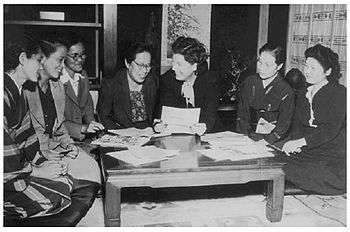Ethel Weed

Ethel Berenice Weed (May 11, 1906 – June 6, 1975) was an American military officer who advocated for the rights of Japanese women during the Allied occupation of Japan following World War II.
Early life
Weed was born on May 11, 1906, in Syracuse, New York, to Grover Cleveland Weed and Berenice (Benjamin) Weed.[2][3] In 1929, she graduated from Western Reserve University (now Case Western Reserve University) with a bachelor's degree in English.[2][3] After graduation, Weed worked as a writer for The Plain Dealer newspaper in Cleveland, Ohio, and then started her own public relations firm.[4]
Japan
In 1943, after the United States had declared war on Japan, Weed closed her business and enlisted with the Women's Army Corps.[4] After graduating from Officer's Candidate School in Fort Oglethorpe, Georgia, Weed was commissioned as a Lieutenant.[4] Two months after the surrender of Japan, Weed was sent to Yokohama to work with the Civil Information and Education Section (CI&E) of Allied command.[4] After expressing an interest in working with Japanese women, Weed was put in charge of CI&E's Women's Affairs program.[4] In this role, Weed worked tirelessly to promote the interests of Japanese women. Her team, in collaboration with Japanese feminist leaders, helped establish the Women's and Minor's Bureau within the Labour Ministry of the Japanese government and worked to reform the Civil and Criminal Codes to establish legal rights for women in Japan.[5] Weed's team also worked to promote civic and political organizations for Japanese women to ensure that these gains would not be short-lived.[6] Today, Weed is remembered as a pivotal figure in establishing women's rights in postwar Japan.[7]
Death
Weed died of cancer on June 6, 1975,[3] in Newtown, Connecticut.[2]
References
- ↑ Eiji Takemae (2003), Allied Occupation of Japan, translated by Robert Ricketts, Sebastian Swann, A&C Black, pp. 185–186, ISBN 9780826415219
- 1 2 3 Commire, Anne (2002). Women in World History: A Biographical Encyclopedia. Waterford, Connecticut: Yorkin Publications. pp. 303–304. ISBN 0787640751.
- 1 2 3 Sicherman, Barbara; Green, Carol Hurd (1993). Notable American Women: The Modern Period: A Biographical Dictionary (6th ed.). Cambridge, Massachusetts: Belknap Press. pp. 721–722. ISBN 0674627334.
- 1 2 3 4 5 Gleich-Anthony, Jeanne M. (2008). Democratizing Women: American Women and the U.S. Occupation of Japan, 1945–1951 (Thesis). Ohio University. pp. 94–97.
- ↑ Takemae, Eiji (2003). The Allied Occupation of Japan. New York: Continuum. p. 329–330. ISBN 0826415210.
- ↑ Gleich-Anthony, Jeanne M. (2008). Democratizing Women: American Women and the U.S. Occupation of Japan, 1945–1951 (Thesis). Ohio University. pp. 119–120.
- ↑ Koikari, Mire (2010). Pedagogy of Democracy: Feminism and the Cold War in the U.S. Occupation of Japan. Philadelphia, Pennsylvania: Temple University Press. p. 80. ISBN 1592137016.
Further reading
- McClain, James L. (2002). Japan: A Modern History. New York: Norton. pp. 526–561. ISBN 039397720X.
- Tsuchiya, Yuka (1993). "Democratizing the Japanese Family: The Role of the Civil Information and Education Section in the Allied Occupation 1945–1952" (PDF). The Japanese Journal of American Studies (PDF). 5: 142–144.